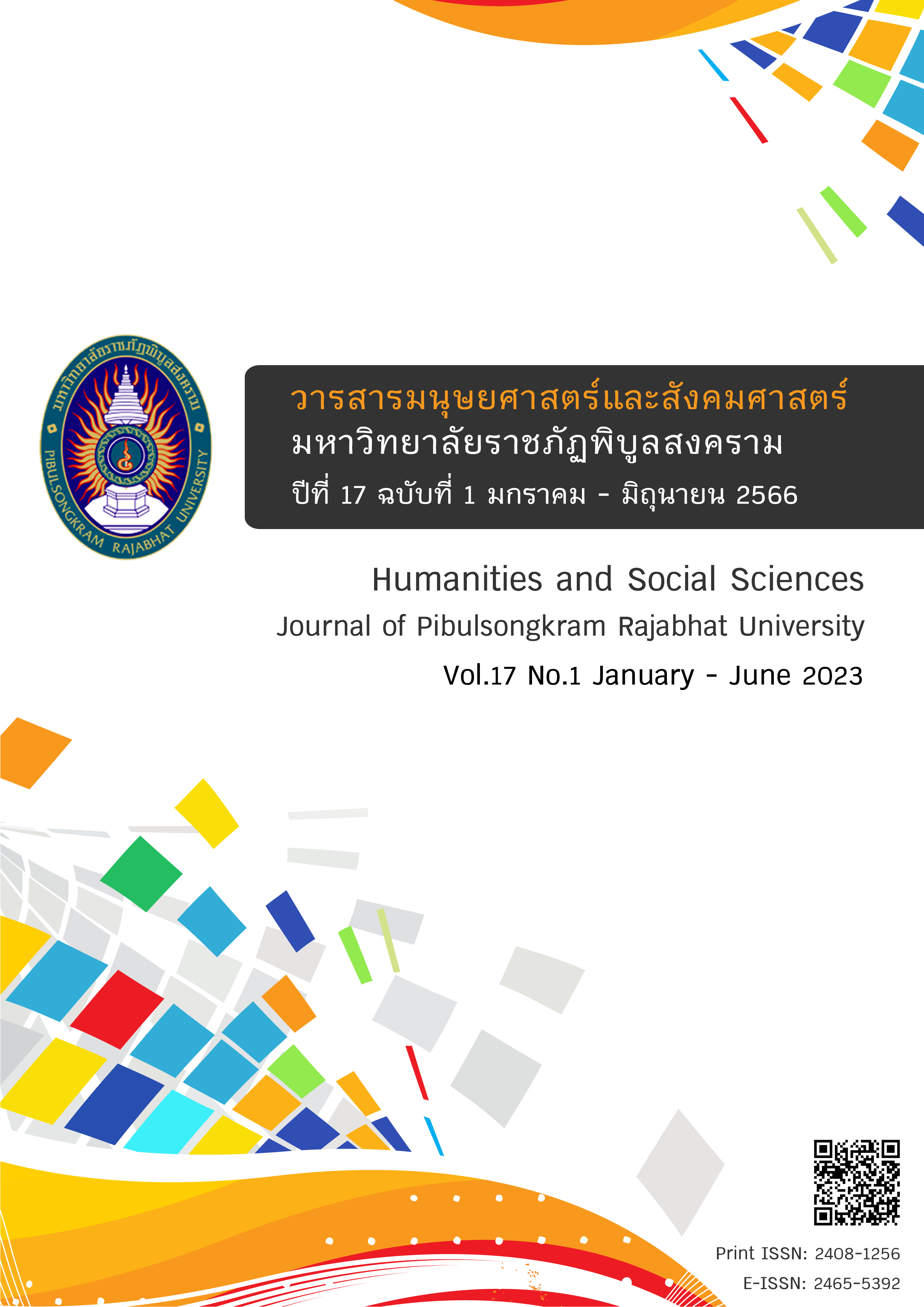Translation of Food and Beverage Names from Thai to English : A Case Study in Phitsanulok
DOI:
https://doi.org/10.14456/psruhss.2023.17Keywords:
Translation strategies, Translation guidelines, Food and beverage namesAbstract
This study aimed to analyze translation strategies of food and beverage names from Thai to English and seek for translation guidelines of the food and beverage names from Thai to English. The data were 2,586 food and beverage translated names (2,302 food names and 284 beverage names) from 31 restaurants in Phitsanulok located in tourist areas and found by Thai owners in 2018. For data analysis, the translation theory framework of Newmark (1988) was applied for the analysis of translation strategies. Also, the syntactic analysis was considered based on Givón (2001 as cited in Wongwattana, 2008). The results reveal that in overall 6 translation strategies were used in the translation of food and beverage names from Thai to English: communicative, semantic, literal, free, adaptation, and faithful. Besides, other forms of translation were also found, including incomplete translation, translation strategies mixed with transliteration, transliteration, and mixed translation strategies. For the translation guidelines suggested for the food and beverage names, most names translated in English (by 96% of all names) were incomplete since both Thai and foreign food cultures have not been seriously taken into account.
References
กมลทิพย์ รักเกียรติยศ. (2559). การพัฒนารายชื่อรายการอาหารทะเลฉบับภาษาจีนสำหรับผู้ประกอบการร้านอาหาร เพื่อส่งเสริมการท่องเที่ยวในเขตอำเภอชะอำ จังหวัดเพชรบุรี. การประชุมวิชาการมหาวิทยาลัยราชภัฏเพชรบุรี, เพชรบุรี.
กระทรวงการท่องเที่ยวและกีฬา. (2560). สถานการณ์การท่องเที่ยวระหว่างประเทศ ปี 2559. สืบค้น 25 ตุลาคม 2560, จาก http://www.mots.go.th/ewt_dl_link.php?nid=8849
ซอสทาร์ทาร์. (2562). สืบค้น 20 เมษายน 2563, จาก https://th.wikipedia.org/wiki/ซอสทาร์ทาร์
ณิชา กลิ่นขจร. (2545). กลวิธีการแปลตำราอาหารไทยเป็นภาษาอังกฤษ กรณีศึกษาตำราอาหาร SPICY THAI CUISINE (วิทยานิพนธ์ปริญญามหาบัณฑิต). กรุงเทพฯ: มหาวิทยาลัยมหิดล.
ธันยพร อรุณฑัต. (2542). การวิเคราะห์รายการอาหารไทยที่แปลเป็นภาษาอังกฤษ (วิทยานิพนธ์ปริญญามหาบัณฑิต). สงขลา: มหาวิทยาลัยทักษิณ.
นูรีดา สะมุ, นูรีมัน ตาเหร์, และมานีซะ ดอลอ. (2560). การวิเคราะห์โครงสร้างภาษาในการแปลชื่ออาหารไทยเป็นภาษาอังกฤษ. วารสารมนุษยศาสตร์และสังคมศาสตร์ มหาวิทยาลัยพะเยา, 5(1), 81-100. สืบค้น 25 มกราคม 2560, จาก https://tci-thaijo.org/index. php/Humanties-up/article/view/91928
พัชรี โภคาสัมฤทธิ์. (2555). การแปลสิ่งทดแทนทางวัฒนธรรมจากภาษาอังกฤษเป็นภาษาไทย (รายงานผลการวิจัย). กรุงเทพฯ: สถาบันบัณฑิตพัฒนบริหารศาสตร์.
รัชนีโรจน์ กุลธำรง. (2552). ความรู้ความเข้าใจเรื่องภาษาเพื่อการแปล: จากทฤษฎีสู่การปฏิบัติ (พิมพ์ครั้งที่ 1). กรุงเทพฯ: สำนักพิมพ์แห่งจุฬาลงกรณ์มหาวิทยาลัย.
ราชบัณฑิตยสถาน. (2542). หลักเกณฑ์การถอดอักษรไทยเป็นอักษรโรมันแบบถ่ายสียง. สืบค้น 21 กันยายน 2560, จาก http://www.royin.go.th/?page_id=619
วรวิทย์ กิจเจริญไพบูลย์. (2546). Culinary Translation. สืบค้น 19 มีนาคม 2560, จาก http://dusithost. dusit.ac.th/~woravit_kit/pdf/Culinary_Translation%202003%20new.pdf
สัญฉวี สายบัว. (2542). หลักการแปล (พิมพ์ครั้งที่ 7). กรุงเทพฯ: สำนักพิมพ์มหาวิทยาลัยธรรมศาสตร์.
สิทธา พินิจภูวดล. (2543). คู่มือนักแปลอาชีพ (พิมพ์ครั้งที่ 2). กรุงเทพฯ: นานมีบุ๊คส์.
สุจิตรา ดวงสนิท. (2558). การศึกษาวิเคราะห์ “กลวิธีการแปลชื่ออาหารไทยเป็นภาษาจีน”. สืบค้น 27 มีนาคม 2560, จาก http://ubulachinese.blogspot.com/2015/05/blog-post_ 64.html
สุพรรณี ปิ่นมณี. (2549). การแปลขั้นสูง (พิมพ์ครั้งที่ 3). กรุงเทพฯ: สำนักพิมพ์แห่งจุฬาลงกรณ์มหาวิทยาลัย.
อัญชลี สิงห์น้อย. (2551). คำกริยาประสมในภาษาไทย: หมวดหมู่ที่ปรับเปลี่ยน ทับซ้อน และสับสน. วารสารภาษาและวัฒนธรรม มหาวิทยาลัยมหิดล, 27(2), 23-40.
อัญชลี สิงห์น้อย. (2553). กลวิธีการแปลหน่วยสร้างประโยคเน้นส่วน. วารสารมหาวิทยาลัย นเรศวร, 18(3), 65-79.
Al- Rushaidi, S., & Ali, H. (2017). Translating Food Menus from English into Arabic: Linguistic and Cultural Dilemmas. Arab World English Journal for Translation and literary Studies, 1(1), 201-212. Retrieved March 25, 2017, from https://awej-tls.org/wp-content/ uploads/2017/03/14.pdf
AmirDabbaghian, A. (2014). Translation and Tourism: A Cross Cultural Communication and the Art of Translating Menus. Journal of Basic and Applied Scientific Research, 4(4), 11-19.
Davoodi, Z. (2009, September). On the Translation of the Taboos. Retrieved from http://www.translationdirectory.com/articles/article2052.php
En papillote. (2020). Retrieved June 15, 2020, from https://en.wikipedia.org/wiki/En_papillote
Ghafarian, M., Kafipour, R., & Soori, A. (2016). Domestication and Foreignisation Strategies in Restaurant Menu Translation. Pertanika Journal of Social Sciences & Humanities (JSSH), 24(4), 1417-1429. Retrieved January 23, 2018, from https://www.researchgate.net/ publication/311816390
Guerra, A. F. (2012). Translating culture: problems, strategies and practical realities. SIC: a journal of literature, culture and literary translation, (5), 0-0. Retrieved from http://hrcak. srce.hr/116870
Hornby, A. S. (2015). Oxford Advanced Learner’s Dictionary (9th ed.). Oxford: Oxford University Press.
Kitamura, K. (2009). Cultural Untranslatability. Translation Journal, 13(3). Retrieved from http://translationjournal.net/journal/49translatability.htm
Larsen-Freeman, D., & Celce-Murcia, M. (1999). The Grammar Book (2nd ed.). USA: Heinle & Heinle.
Low, P. (2015). English Translation of Thai Food Names and Description. Retrieved January 17, 2018, from http://25qt511nswfi49iayd31ch80-wpengine.netdna-ssl.com/wp-content/ uploads/papers/acll2015/ ACLL2015_08626.pdf
Mu, C. (2010). English Translation of Chinese Dish Names. Translation Journal, 14(4). Retrieved January 18, 2018, from http://translationjournal.net/ journal/54dishes. htm
Newmark, P. (1988). A Textbook of Translation: Prentice-Hall International.
Ordudari, M. (2007). Translation procedures, strategies and methods. Translation Journal, 11(3). Retrieved from http://translationjournal.net/journal/41culture.htm
Saleh, K. (2011). Translating Restaurants' Menus from English into Arabic: Problems and Strategies (Master’s thesis). Palestine: An- Najah National University. Retrieved January 21, 2018, from https://scholar.najah.edu/sites/default/ files/all-thesis/ kefaya_saleh.pdf
Downloads
Published
How to Cite
Issue
Section
License
Copyright (c) 2022 Humanities and Social Sciences Journal of Pibulsongkram Rajabhat University

This work is licensed under a Creative Commons Attribution-NonCommercial-NoDerivatives 4.0 International License.
Any articles or comments appearing in the Journal of Humanities and Social Sciences, Rajabhat Phibulsongkram University, are the intellectual property of the authors, and do not necessarily reflect the views of the editorial board. Published articles are copyrighted by the Journal of Humanities and Social Sciences, Rajabhat Phibulsongkram University.









